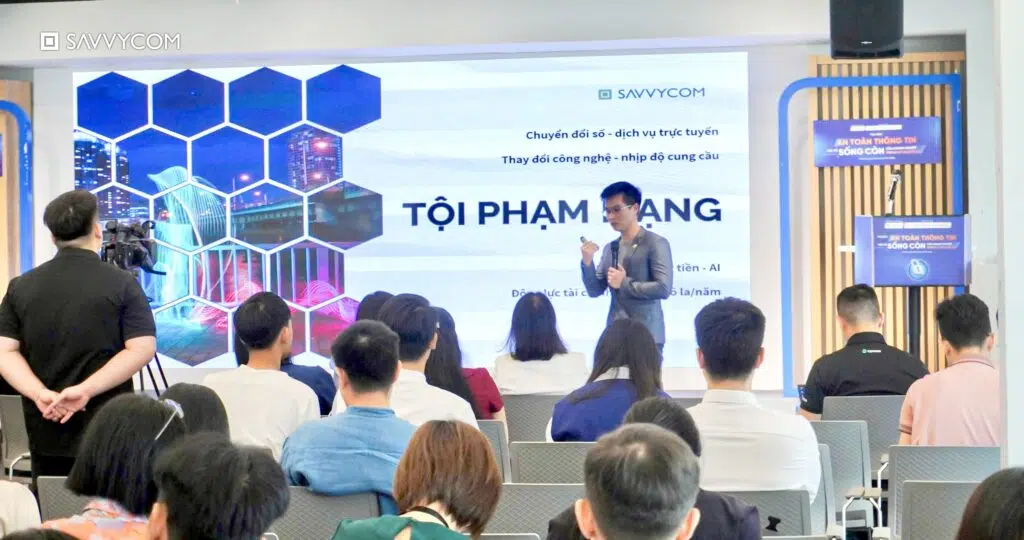Fortifying the Future: Information Security – Critical for Your Business in the Digital Age
In the rapidly evolving digital landscape, cybersecurity has become a critical issue for businesses of all sizes. The seminar “Information Security – Critical for Your Business in the Digital Age,” organized by Savvycom in collaboration with the Hanoi Entrepreneurs Women Association (HNEW), MISA, CyPeace, and Hanel, successfully concluded with over 400 attendees. Especially, the event featured valuable insights from Mr. Phu Le, Deputy Director of VNCERT/CC, emphasizing the urgent need for stronger cybersecurity frameworks and solutions, particularly as the number of cyberattacks, especially those targeting small and medium enterprises (SMEs), continues to rise.

Mr. Huy Nguyen shares critical insights on the rising threat of cyberattacks and their impact
Rising Cyber Threats Against Businesses
Mr. Quang Huy Nguyen, Director of Information Security Services at Savvycom, delivered an in-depth analysis of the current cybersecurity landscape. He revealed that 42% of businesses in Vietnam and globally have no comprehensive plan to manage cyber threats, while one-third rely on free or low-cost solutions that lack the necessary robustness to counter sophisticated attacks. “This lack of preparedness leaves organizations highly vulnerable, particularly to advanced forms of attacks such as ransomware, which has become a major disruptor in recent years,” he stated.
The statistics provided during the seminar were stark, with Mr. Huy emphasizing the consequences of insufficient cybersecurity measures. “In 2023, cybercrime cost businesses worldwide billions of dollars, with a significant portion attributed to phishing and ransomware attacks. These attacks are not only financially crippling but also cause long-lasting reputational damage.” His insights underscored that businesses are underestimating the real financial and operational risks posed by cyber threats.

Mr. Huy underscores the necessity of implementing robust cybersecurity measures to safeguard digital assets
ChatGPT đã nói:
Strengthening Cybersecurity Measures
In response to escalating cyber threats, Savvycom representative and other experts outlined several actionable strategies that businesses should adopt to strengthen their defenses. These included:
-
Comprehensive Password Management: Businesses are encouraged to implement strong password policies, requiring unique, complex passwords for each account. Two-factor authentication (2FA) is also recommended to provide an added layer of protection.
-
Employee Training and Vigilance: Human error remains one of the largest risks to cybersecurity. Regular training is essential to equip employees with the skills to recognize phishing attacks, social engineering, and other common threats. Creating a culture where employees can report suspicious activities without hesitation is key to preventing security breaches.
-
Automated Security Updates and Backup Systems: To address vulnerabilities caused by outdated software, businesses should automate software updates. Robust backup solutions, particularly those integrated with SaaS platforms, are vital for ensuring data recovery in the event of a ransomware attack. Secure backups serve as a critical line of defense, preventing companies from succumbing to ransom demands.
-
Continuous Threat Monitoring and Incident Response: Businesses must stay vigilant by continuously monitoring for potential threats. Regular security assessments, real-time threat detection, and a clear incident response plan can mitigate damage when a breach occurs. Proactive threat identification and swift action are crucial in minimizing cyber risks.
These measures emphasize the importance of a proactive, multi-layered approach to cybersecurity, ensuring that businesses remain resilient against evolving cyber threats.
Cybersecurity: No Longer Optional, But Essential

Savvycom CEO joins distinguished guests, showcasing their collective commitment to advancing cybersecurity initiatives.


